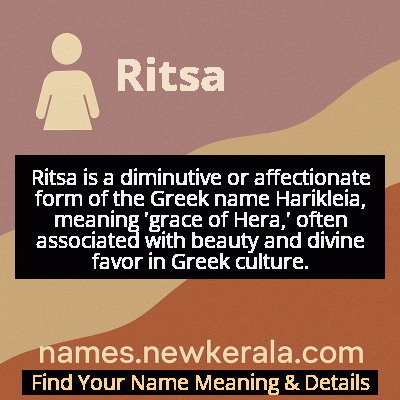Ritsa Name Meaning & Details
Origin, Popularity, Numerology Analysis & Name Meaning of Ritsa
Discover the origin, meaning, and cultural significance of the name RITSA. Delve into its historical roots and explore the lasting impact it has had on communities and traditions.
Name
Ritsa
Gender
Female
Origin
Greek
Lucky Number
4
Meaning of the Name - Ritsa
Ritsa is a diminutive or affectionate form of the Greek name Harikleia, meaning 'grace of Hera,' often associated with beauty and divine favor in Greek culture.
Ritsa - Complete Numerology Analysis
Your Numerology Number
Based on Pythagorean Numerology System
Ruling Planet
Uranus (Rahu)
Positive Nature
Strong sense of order, loyal, practical, and disciplined.
Negative Traits
Stubborn, overly serious, rigid, and prone to feeling restricted.
Lucky Colours
Blue, gray.
Lucky Days
Saturday.
Lucky Stones
Blue sapphire.
Harmony Numbers
1, 7, 8.
Best Suited Professions
Managers, engineers, accountants, organizers.
What People Like About You
Dependability, discipline, practicality.
Famous People Named Ritsa
Ritsa Panagiotou
Greek actress
Renowned Greek theater and television actress known for her powerful performances in Greek drama
Ritsa Kagia
Greek singer
Traditional Greek folk singer who preserved and performed authentic Greek musical heritage
Ritsa Koundouri
Environmental economist
Leading researcher in environmental economics and sustainable development at Athens University
Name Variations & International Equivalents
Click on blue names to explore their detailed meanings. Gray names with will be available soon.
Cultural & Historical Significance
The name also carries connections to Greek Orthodox traditions, where protection is a divine attribute, linking earthly guardianship with spiritual safeguarding. During the Ottoman occupation of Greece, names with protective meanings like Ritsa gained additional significance as symbols of cultural preservation and resistance. In modern Greek culture, Ritsa continues to represent the ideal of the strong, protective mother figure who maintains family traditions while adapting to contemporary life. The name's enduring popularity reflects its deep roots in Greek cultural identity and its embodiment of values that remain central to Greek family and community life.
Extended Personality Analysis
Individuals named Ritsa typically exhibit strong protective instincts combined with remarkable emotional intelligence. They are natural caregivers who intuitively understand others' needs and often put the welfare of their loved ones before their own. This protective nature manifests not just physically but emotionally and intellectually—Ritsas are often the confidantes and advisors in their social circles. Their strength is balanced by deep empathy, making them both resilient and compassionate. Ritsas tend to be highly principled individuals with a strong sense of justice and fairness, often taking on roles where they can advocate for others or protect vulnerable individuals.
In professional and personal relationships, Ritsas demonstrate exceptional loyalty and reliability. They possess natural leadership qualities but exercise them through consensus-building rather than authoritarian approaches. Their communication style is typically direct yet diplomatic, allowing them to mediate conflicts effectively. While they can be fiercely determined when protecting what they value, they maintain a warmth and approachability that draws people to them. This combination of strength and sensitivity makes Ritsas particularly effective in roles requiring both emotional intelligence and decisive action, from family leadership to professional positions in education, healthcare, or community organizing.
Modern Usage & Popularity
In contemporary naming practices, Ritsa maintains a stable presence primarily within Greek communities both in Greece and the diaspora. While not among the most popular modern Greek names, it enjoys consistent usage as a traditional choice that honors family heritage. Recent naming data from Greece shows Ritsa appearing most frequently in northern regions and among families with strong connections to traditional values. The name has adapted well to modern professional environments, with many Ritsas excelling in fields that align with the name's protective connotations—particularly law, education, social work, and healthcare. Internationally, the name remains relatively rare outside Greek communities, though it has gained some recognition through cultural exports and the global Greek diaspora. Digital era naming trends indicate that Ritsa is often chosen by parents seeking meaningful traditional names that work well in both Greek and international contexts, balancing cultural specificity with global accessibility.
Symbolic & Spiritual Meanings
The symbolic meanings of Ritsa extend far beyond its literal translation as 'protector of man.' In Greek cultural symbolism, the name represents the archetype of the guardian who protects not just physically but spiritually and emotionally. It embodies the ancient Greek concept of 'phrouros' (guardian) while incorporating modern understandings of emotional intelligence and community care. The name carries strong associations with the Greek ideal of 'philotimo'—the complex concept of honor, responsibility, and proper social behavior that forms the foundation of Greek ethical systems. In natural symbolism, Ritsa is often linked to the olive tree, representing peace, protection, and enduring strength through challenging circumstances. The name also evokes the imagery of the ancient Greek hearth, symbolizing home protection, family continuity, and the sacred space of domestic safety. These layered symbolic meanings position Ritsa as a name that connects individual identity with broader cultural archetypes of protection, preservation, and nurturing strength across generations.

